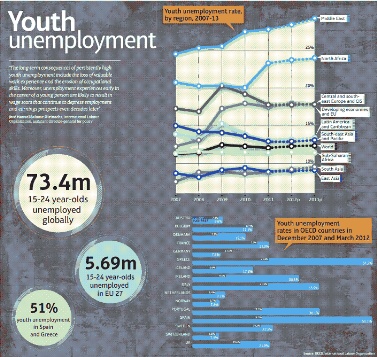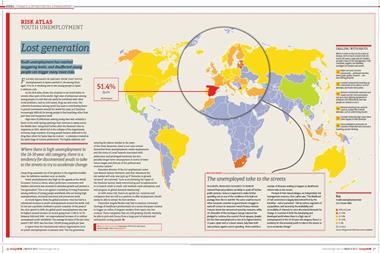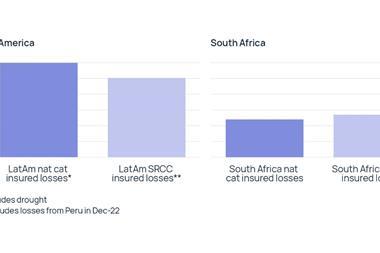A lack of opportunities for young people to realise their potential and develop skills could have severe political and economic consequences

The world is getting increasingly worried about its young people ever finding work.
Global unemployment among people under the age of 24 is set to continue growing over the next five years, and is projected to reach 12.8% by 2018, according to the International Labour Organisation (ILO).
The experience varies between countries -advanced economies are seeing an increase in persistent unemployment, zero hour contracts, temporary jobs and growing youth discouragement, while in developing countries the picture is of a proliferation of poor quality, informal, subsistence jobs - but the overall effect is the same. A generation is entering adulthood without experience of regular, meaningful work, posing a risk not only to their own prospects and earnings potential, but also a broader risk to society as a frustrated, increasingly angry, mass of young people searches for a purpose.
It is no coincidence that the regions with the highest unemployment rates in 2012 - the Middle East, at 28.3% and North Africa, at 23.7%, according to the ILO - were also some of the most unstable.
Europe has also been badly affected: in advanced economies, youth unemployment in 2012 averages 18.1%, but in Greece and Spain, the statistics tell a depressing story with more than half of potentially economically active young people in these countries now unemployed.
Maplecroft senior analyst for Europe and Central Asia Florian Otto says: “Youth unemployment represents a significant medium- and long-term risk to the European economy. From a political perspective, high levels of long-term youth unemployment have the potential to reinforce the notion among the younger generation that they have no stake in society. Two likely results are increased political apathy or a growing attractiveness of radical political ideas, both reflecting strong disenchantment with established political actors, or, even more worryingly, the political system as a whole.”
Youth unemployment holds back economic growth “From an economic perspective, youth unemployment will weigh on welfare spending and hold back economic growth. The issue has a self-reinforcing dynamic over time - the longer young people are out of work, the more difficult it becomes to find employment.”
However, the situation is not only defined by a lack of jobs, but also, in some areas, a systemic failure to provide appropriate training. “There is a ‘skills gap’ working both ways,” says Otto. “A lot of young European graduates face the choice of working in a job for which they are overqualified or not qualified at all, accepting extended phases of unpaid or low-paid internships, or not working at all.
“The long-term consequences of this development are potentially very problematic, not only in terms of reduced productivity but also in terms of the development of expertise and skills. The prospects for young people who only have basic education are particularly worrying, as they face being shut out from a labour market that increasingly requires specialist expertise, advanced technical skill and the ability to adapt to technological innovation.”




















No comments yet